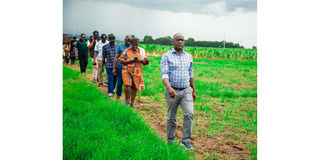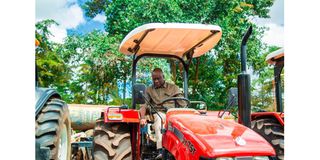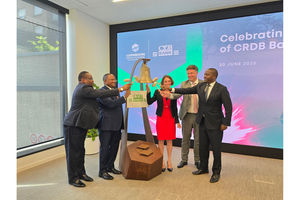AGRA’s RE-GAIN Initiative: A bold step towards reducing post-harvest losses and building climate resilient agriculture in Tanzania

AGRA’s Country Director, Vianey Rweyendela
What you need to know:
- In this interview with The Citizen’s Seif Kabelele, AGRA’s Country Director, Vianey Rweyendela, outlines how the newly launched RE-GAIN programme; an ambitious initiative by the Alliance for a Green Revolution in Africa (AGRA) in partnership with the Green Climate Fund (GCF) aims to reduce post-harvest food losses in Tanzania while strengthening resilience to climate change. Focusing on key staples such as rice and maize, the five-year initiative will introduce modern technologies, promote climate-smart agricultural practices, and empower smallholder farmers, particularly women and youth. Rweyendela also highlights AGRA’s close collaboration with the government and private sector to ensure that the programme’s impact is both far reaching and sustainable.
Could you elaborate on the primary objectives of the RE-GAIN programme and how it aims to reduce post-harvest losses in Tanzania?
The RE-GAIN programme seeks to curb post-harvest losses in Tanzania by scaling up the use of Food Loss Reduction Solutions (FL-RS). It follows a three-fold approach: raising awareness and access among smallholder farmers, supporting MSMEs with finance and supply of technologies, and fostering a supportive policy environment. This ensures locally led, viable, and sustainable solutions. At the Dodoma launch, we highlighted the importance of public-private partnerships in tackling food loss and building climate resilience.
Why were rice and maize selected as the focal crops for this initiative, and what specific interventions are planned for these staples?
Rice and maize are vital staples in Tanzania, yet suffer high post-harvest losses worsened by climate change. RE-GAIN combats this with climate-smart storage, farmer training, and market access—solutions shaped by national studies and stakeholder input.
What modern technologies and practices will be introduced to farmers through RE-GAIN, and how will these address current post-harvest challenges?
RE-GAIN is introducing a range of Food Loss Reduction Solutions (FL-RS) that are both practical and climate-resilient. These include hermetic storage bags, metal and plastic silos, solar dryers, mechanical threshers, moisture meters, and improved storage facilities. Training will focus on harvesting, sorting, grading, packaging, and moisture control techniques to minimise losses caused by mould, pests, and aflatoxins. Digital innovations—such as mobile platforms for market linkages and climate advisories—will further equip farmers to make informed decisions and reduce spoilage during transport and storage.
In what ways does the RE-GAIN programme integrate climate adaptation strategies to enhance the resilience of Tanzania's agricultural sector?
Climate adaptation lies at the core of RE-GAIN. The programme introduces climate-resilient storage technologies to protect harvests from erratic rainfall and humidity. It also promotes improved post-harvest practices such as moisture control, rapid drying, and pest management. Crucially, RE-GAIN provides digital climate advisories and weather alerts directly to farmers, enabling them to anticipate climate risks and respond effectively. These efforts support Tanzania’s commitments under its Nationally Determined Contributions (NDCs) and the National Climate Change Response Strategy, strengthening long-term resilience among farming communities.

How will the programme support smallholder farmers in adopting climate-smart agricultural practices?
RE-GAIN empowers smallholder farmers with practical training, hands-on demonstrations, and financial support. Through smart subsidies, co-payment, and lease-to-own models, we ease access to technologies like hermetic bags and solar dryers. Farmers also receive guidance on soil and water management, pest control, and safe storage. Digital platforms offer weather updates, market prices, and agronomic tips, helping even remote farmers adopt climate-smart practices.
What strategies are in place to ensure effective training and knowledge transfer to farmers regarding optimal harvesting and storage techniques?
Our approach is based on a decentralised extension model, working with village-based advisors and lead farmers to spread knowledge through peer learning. Demonstration plots and model storage units act as practical learning sites. In addition to in-person training, we use SMS, voice messages, and mobile apps to share timely advice on drying, grading, and storage. Partnerships with NGOs, agro-dealers, and local authorities help ensure wide reach and long-term impact. Over 5,000 local agents will support knowledge transfer to more than 1 million farmers across the country.
How does AGRA plan to involve local communities and stakeholders in the implementation and monitoring of the RE-GAIN programme?
Local ownership is key to RE-GAIN’s sustainability. We involve farmer groups, local leaders, NGOs, and government representatives at every stage, from planning to monitoring. Participatory tools like community scorecards provide real-time feedback, while joint reviews with district authorities ensure progress aligns with local needs. This inclusive approach fosters transparency and lasting partnerships beyond the project’s lifecycle.
What metrics and indicators will be used to assess the success of the RE-GAIN programme over its five-year span?
We will track a reduction in post-harvest losses by percentage, adoption rates of FL-RS, number of farmers trained, crop volumes safely stored, increased incomes, and market access improvements. Additional indicators include reduction in aflatoxin levels, number of women and youth-led enterprises supported, and jobs created within the post-harvest value chain. These metrics will inform mid-term reviews and final evaluations.
How will AGRA ensure transparency and accountability in tracking the programme's progress and outcomes?
RE-GAIN integrates a robust Monitoring, Evaluation, and Learning (MEL) system with digital dashboards, third-party audits, and field verification. We publish periodic progress reports and engage stakeholders in joint reviews to validate outcomes. Community-level platforms ensure local tracking and reporting, while government partners participate in oversight mechanisms. Transparency isn’t just a principle; it’s a practice embedded in our daily operations.

How does the RE-GAIN programme align with Tanzania's Agricultural Sector Development Programme Phase II (ASDP II) and other national policies?
RE-GAIN is fully aligned with ASDP II, particularly its focus on commercialization, value addition, and climate resilience. The programme advances the National Climate Change Strategy and supports food and nutrition security by reducing food waste and improving crop quality. Through inclusive interventions, RE-GAIN also aligns with national gender and youth empowerment frameworks.
In what ways is AGRA collaborating with the Tanzanian government to ensure the sustainability and scalability of the programme's interventions?
We work hand-in-hand with the Ministry of Agriculture, local governments, and public institutions to embed RE-GAIN interventions into existing systems. Our activities are co-implemented with LGAs and extension services, and we support capacity building at district and national levels. By anchoring the programme within government frameworks, we ensure sustainability and pave the way for nationwide scaling of successful models.
What measures are being taken to ensure that women and youth are actively involved and benefit from the RE-GAIN programme?
RE-GAIN employs a gender- and youth-responsive approach across all its components. We prioritize women- and youth-led farmer groups for training, financial support, and technology access. Tailored agribusiness mentorship and financial literacy modules are being rolled out. We also promote their participation in MSMEs that supply and service FL-RS technologies, fostering inclusive economic growth.
How does AGRA address the challenges faced by these groups in accessing resources and opportunities within the agricultural sector?
We work with financial institutions to design loan products tailored to youth and women, link them to input suppliers and off-takers, and offer mentorship through experienced agripreneurs and extension officers. We also advocate for inclusive land and credit policies to dismantle structural barriers that limit resource access for marginalized groups.
Can you discuss AGRA's approach to attracting private sector investment to support the objectives of the RE-GAIN programme?
AGRA builds business cases for investing in food loss reduction, showing clear ROI to private investors. RE-GAIN creates demand through awareness and market development while reducing investment risk via smart subsidies and co-financing models. We partner with agro-dealers, processors, storage solution providers, and financial institutions to unlock capital and foster innovation. This ecosystem-wide approach ensures that post-harvest solutions are both scalable and investable.
What role do public-private partnerships play in enhancing the effectiveness and reach of the programme?
Public-private partnerships are the engine behind RE-GAIN. These alliances enable resource pooling, innovation, and reach. We collaborate with government to shape enabling policies; with private firms to deliver scalable solutions; and with NGOs to ensure social inclusion. This model ensures that interventions are rooted in public good but driven by private efficiency.
Based on AGRA's previous initiatives in Tanzania, what key lessons have been learned that are being applied to the RE-GAIN programme?
We’ve learned that sustainability hinges on local ownership, context-driven design, and market integration. Our past initiative, YieldWise, taught us the value of aggregating farmers for input and output markets, and the importance of post-harvest infrastructure. These insights have been embedded in RE-GAIN to enhance resilience, inclusivity, and scalability from day one.
Looking ahead, how does AGRA envision the evolution of Tanzania's agricultural landscape in the next decade, particularly concerning food security and climate resilience?
We envision a transformed agricultural sector—climate-resilient, digitally enabled, and inclusive. Smallholder farmers will be empowered as commercial producers, agribusinesses will thrive across value chains, and public-private platforms will drive innovation. With sustained investment and policy coherence, Tanzania can emerge as a continental leader in food systems transformation. RE-GAIN is the first step in that journey, laying the foundation for lasting impact.




